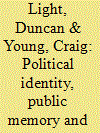|
|
|
Sort Order |
|
|
|
Items / Page
|
|
|
|
|
|
|
| Srl | Item |
| 1 |
ID:
098089


|
|
|
|
|
| Publication |
2010.
|
| Summary/Abstract |
The article analyses the impact of international justice on the debate about public memory and visions of reconciliation in Namibia. Focusing on a recent submission to the International Criminal Court, it shows how domestic actors used international justice to advance their claims for reconciliation and it thus challenges the common assumption that reconciliation is an entirely domestic process. The article discusses how the ICC submission individualized guilt for past human rights abuses and neglected structures of suspicion and denunciation within the guerrilla movement SWAPO. The submission also challenged once more the government's efforts to reduce the complex history of the country's anti-colonial war to a narrative of a unified struggle, and showed that the official policy of active forgetting was still questioned after almost two decades of imposed silence.
|
|
|
|
|
|
|
|
|
|
|
|
|
|
|
|
| 2 |
ID:
168877


|
|
|
|
|
| Summary/Abstract |
After a genocide, leaders compete to fill the postwar power vacuum and establish their preferred story of the past. Memorialisation, including through building memorials, provides a cornerstone of political power. The dominant public narrative determines the plotline; it labels victims and perpetrators, interprets history, assigns meaning to suffering, and sets the post-atrocity political agenda. Therefore, ownership of the past, in terms of the public account, is deeply contested. Although many factors affect the emergence of a dominant atrocity narrative, this article highlights the role of international interactions with genocide memorials, particularly how Western visitors, funders, and consultants influence the government's narrative. Western consumption of memorials often reinforces aspects of dark tourism that dehumanise victims and discourage adequate context for the uninformed visitor. Funding and consultation provided by Western states and organisations – while offering distinct benefits – tends to encourage a homogenised atrocity narrative, which reflects the values of the global human rights regime and existing standards of memorial design rather than privileging the local particularities of the atrocity experience. As shown in the cases of Rwanda, Cambodia, and Bosnia, Western involvement in public memory projects often strengthens the power of government narratives, which control the present by controlling the past.
|
|
|
|
|
|
|
|
|
|
|
|
|
|
|
|
| 3 |
ID:
099636


|
|
|
|
|
| Publication |
2010.
|
| Summary/Abstract |
This article analyses the inter-relationship between political identity, public memory and urban space in South-east Europe through a case study of Parcul Carol I (Carol I Park) in Bucharest, Romania from 1906 to the present. The article analyses how the urban cultural landscape has been reshaped to support the political ambitions of three successive regimes-Romania as a kingdom and liberal constitutional monarchy (1881-1938); state-socialist Romania (1947-1989); and the post-socialist Romanian state from 1989. The article highlights complex continuity from the state-socialist period under post-socialism, rather than destruction of the landscape of state-socialism, combined with the return of pre-socialist landscape elements. The article argues for the need for studies of the fate of state-socialist urban landscapes under post-socialism which consider the complexities introduced by the persistence of landscape elements from the pre-socialist and state-socialist periods and their combination with pre-socialist and post-socialist landscapes to produce hybrid memory-scapes and spaces of the nation.
|
|
|
|
|
|
|
|
|
|
|
|
|
|
|
|
| 4 |
ID:
185741


|
|
|
|
|
|
|
|